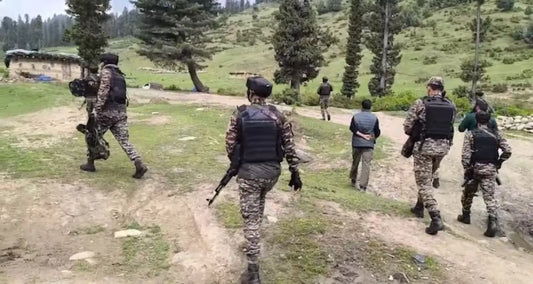UNSC Identifies TRF's Involvement in Pahalgam Attack in Landmark Report

In a noteworthy diplomatic achievement for India, a newly released report by the United Nations Security Council has, for the first time, officially associated The Resistance Front (TRF), a proxy of the prohibited Lashkar-e-Taiba (LeT), with the terrorist attack that occurred on April 22 in Pahalgam, Jammu and Kashmir, resulting in the death of 26 civilians.
The report was issued by the UN Security Council's monitoring team, which oversees the enforcement of sanctions against al-Qaeda and the Islamic State. It verifies that TRF initially took credit for the attack, only to retract its statement days later, a common method used to evade responsibility.
On April 22, five terrorists carried out an assault at a well-known tourist destination in Pahalgam. The group initially released a photograph of the location while claiming responsibility. However, they retracted their claim within days, and no other group came forward to claim the attack.
The UN report also references two member states, likely India and the United States, affirming that TRF executed the massacre and indicating that it could not have done so without Lashkar-e-Taiba's support. Pakistan, however, refuted these findings, reiterating its longstanding position that LeT is no longer active due to domestic prohibitions.
This development is particularly significant as Pakistan previously succeeded in removing any references to TRF and the Pahalgam incident from a Security Council press note issued soon after the attack. This time, however, Islamabad did not succeed in preventing TRF's inclusion in the official report. Notably, China, which has previously implemented technical holds to protect Pakistani-backed groups, chose not to intervene.
The report is the first in several years to explicitly link LeT and other Pakistan-based entities to violence in Kashmir. Security experts suggest it challenges Islamabad's strategy of using seemingly harmless names like TRF or People Against Fascist Front to disguise the actions of globally banned terror groups like LeT and Jaish-e-Mohammed.
In response to the Pahalgam massacre, a senior Indian delegation visited the United States in mid-May to brief the 1267 Sanctions Committee and UN counterterrorism officials. India also submitted an intelligence dossier expanding on prior reports shared in May and November 2024, along with warnings issued in December 2023.
The April 22 attack led to a decisive military operation termed Operation Sindoor, which commenced on May 7. The operation included targeted drone and missile strikes across the Line of Control, resulting in a four-day exchange of fire until a ceasefire was reinstated on May 10.
The identification of TRF in the UN report is now considered a crucial advancement towards securing its designation as a global terrorist organization. The development strengthens India’s diplomatic standing and escalates pressure on Pakistan to take action against terror proxies operating within its borders.



















